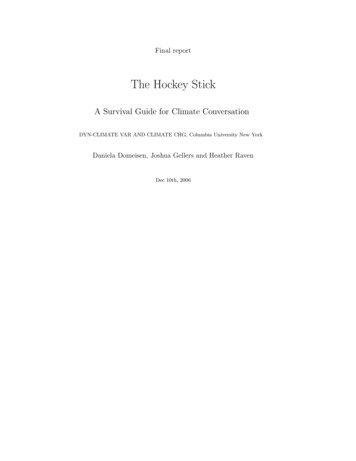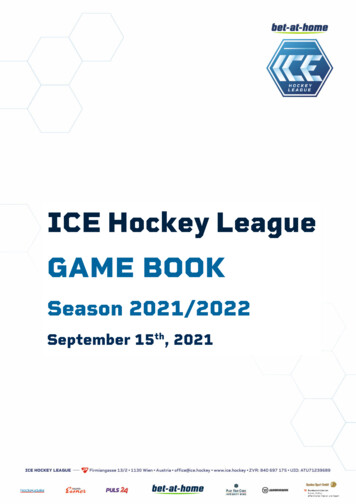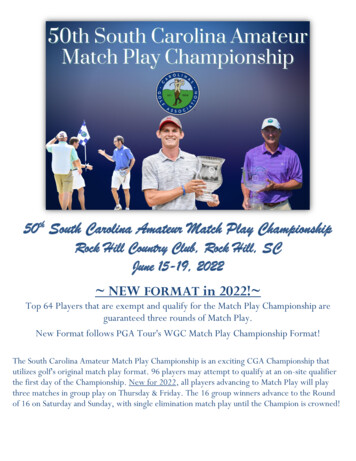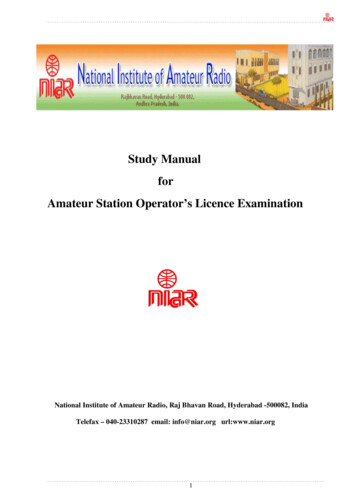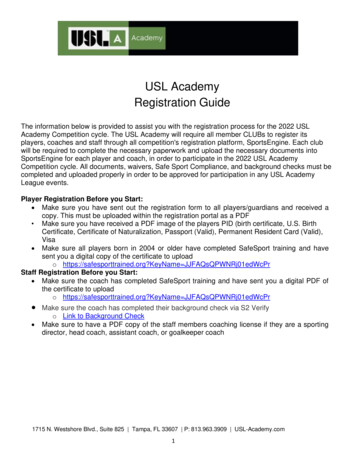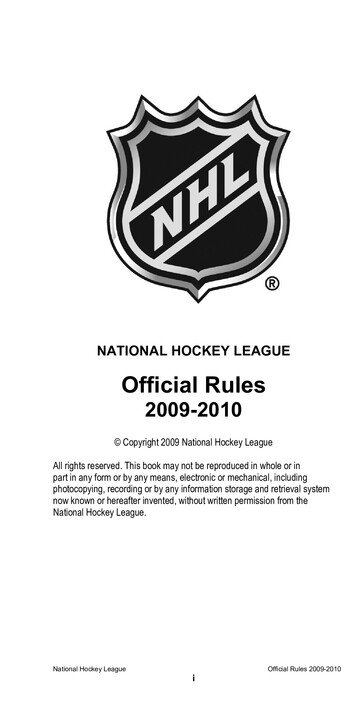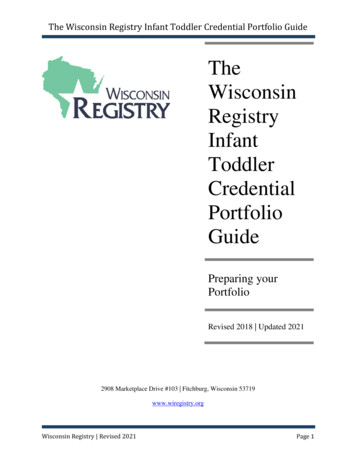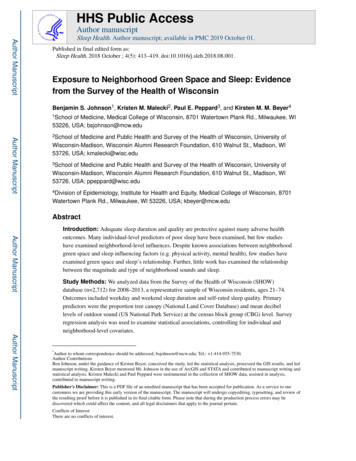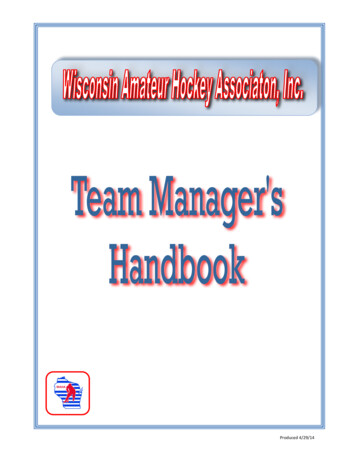
Transcription
Produced4/29/14
Wisconsin Amateur Hockey Association Team Managers HandbookThank you for agreeing to serve as the Team Manager for your team. An organized Team Manageris vital to a successful season. This handbook was developed in order to make your initiation as aTeam Manager a little smoother. Sometimes the first month may be a little puzzling, as you begin tolearn the paperwork and scheduling. This handbook should clarify most questions.As the year progresses you will be amazed at the number of people you meet throughout thedifferent hockey associations. Being a Team Manager is an educational and rewarding position. Youand your family can take great pride, knowing your involvement made for a positive experience foryour Skaters, Parents, and Coaches.With appreciation,The Wisconsin Amateur Hockey Association Board of Directors2WAHATeamManager’sHandbook
Being a member of your Association means you are also a member of:1. USA Hockey(The National non-profit governing body for amateur hockey competition)a. Established in 1937, was formerly known as AHAUS or Amateur HockeyAssociation of the United States. In 1990, the name was changed to USA Hockey.b. Coordinates all amateur competition.c. Responsible for the selection & training of the U.S. National & Olympic teams.d. Publishes "American Hockey Magazine" - you receive this 8 times/year.e. Publishes an Annual Guide which spells out all rules and regulations of USAHockey’s governance.f. Supplies the USA Hockey Insurance. You must have this to skate with the Club.g. Distributes Hat Trick, Zero, and Playmaker awards.h. There are 12 Districts of USA HOCKEY, Wisconsin is in the "Central District".2. Wisconsin Amateur Hockey Association (WAHA)(An Affiliate Member of USAHockey)a. WAHA governs amateur hockey in Wisconsin, in accordance with USA Hockeyregulations.b. WAHA conducts the State Tournament competitions, which are held in March.c. WAHA is divided into 6 regions.d. Associations in WAHA are classified as Division 1, Division 2, Division 3 orDivision 4. WAHA uses certain criteria to classify all Associations. The criteria usedto determine an Association’s classification includes, but is not limited to, number ofregistered skaters, access to ice, State Tournament experience. The intent of theseclassifications is to provide appropriate levels of competition for all teams involvedin State Tournament.e. Your Association must register your first team at each age level to enter StateTournament. If your first team (highest ranked) is not entered, the lower teamsfollowing, such as the 2nd, 3rd, teams cannot enter.f. All six Regions of WAHA conduct regional playoffs to determine teams that willplay in the State Tournaments. These playoffs are conducted on the first fullweekend in February.g. A main source of information for everyone is the WAHA Annual Guide. WAHAprints a limited number of the Guides, but it can be found on the WAHA web ok
AGE CLASSIFICATIONSBelow are the age classifications of players in USA Hockey/WAHA:1)HIGH SCHOOL.a) A High School team shall consist of only those players registered and attending a registered high school or anapproved DPI home study program, or registered combination of high school districts approved by WAHA,and limited to amateurs who are 18 years of age and under on the first day of the school year of the season inwhich they wish to play.2)MIDGET 18 & UNDER. Restricted to any youth whose parents’ residence is the State of Wisconsin and limited toamateurs who are 18 years of age and under on or before Dec. 31 of the hockey season in which they wish to play.3)MIDGET 16 & UNDER. Restricted to any youth whose parents’ residence is the State of Wisconsin and limited toamateurs who are 16 years of age and under on or before Dec. 31 of the hockey season in which they wish to play.4)BANTAM. Restricted to any youth whose parents’ residence is the State of Wisconsin and limited to amateurs whoare 14 years of age and under on or before Dec. 31 of the hockey season in which they wish to play5)PEEWEE. Restricted to any youth whose parents’ residence is the State of Wisconsin and limited to amateurs whoare 12 years of age and under on or before Dec. 31 of the hockey season in which they wish to play.6)SQUIRT. Restricted to any youth whose parents’ residence is the State of Wisconsin and limited to amateurs whoare 10 years of age and under on or before Dec. 31 of the hockey season in which they wish to play.7)MITE. Restricted to any youth whose parents’ residence is the State of Wisconsin and limited to amateurs who are8 years of age and under on or before Dec. 31 of the hockey season in which they wish to play.8)GIRLS 19 & UNDER - Restricted to any girl, whose residence is the State of Wisconsin and limited to amateurswho are nineteen (19) years of age and under on or before Dec. 31 of the hockey season in which they wish to play9)GIRLS 16 & UNDER - Restricted to any girl, whose parent’s residence is the State of Wisconsin and limited toamateurs who are sixteen (16) years of age and under on or before Dec. 31 of the hockey season in which they wishto play.10) GIRLS 14 & UNDER – Restricted to any girl, whose parent’s residence is the State of Wisconsin and limited toamateurs who are fourteen (14) years of age and under on or before Dec. 31 of the hockey season in which theywish to play.11) GIRLS 12 & UNDER - Restricted to any girl, whose parent’s residence is the State of Wisconsin and limited toamateurs who are twelve (12) years of age and under on or before Dec. 31 of the hockey season in which they wishto play.12) GIRLS 10 & UNDER - Restricted to any girl, whose parent’s residence is the State of Wisconsin and limited toamateurs who are ten (10) years of age and under on or before Dec. 31 of the hockey season in which they wish toplay.13) GIRLS 8 & UNDER - Restricted to any girl, whose parent’s residence is the State of Wisconsin and limited toamateurs who are eight (8) years of age and under on or before Dec. 31 of the hockey season in which they wish toplay4WAHATeamManager’sHandbook
Outline of A Team Manager’s DutiesThe Team Manager wears many hats during the hockey season. You may find you do not have thetime or desire to do all of the job duties. Then delegate some of these duties to other team parents.The benefit of including parents you can rely on to get a job done is two-fold. Not only does itlighten your load, it also makes others become responsible, making them feel even more a part ofthe team. Parents who are an active part of an endeavor find it more difficult to offer criticism, andtend to have a more positive outlook. Team Effort, takes on meaning off the ice, too! The followingis a general outline of a Team Manager’s duties.1) Communicatora) You will be the go-between for your team. The person who passes on any informationbetween the coaches and the parents, your organization and your team, parents and coaches,and all other sources from anywhere outside of your team.b) You should hold a meeting at the beginning of the season. This meeting will be for thepurpose of:i) Meeting for all of the parentsii) Parents to meet the coachesiii) Coaches to discuss their coaching philosophy and team rulesiv) Decide if the team will participate in any tournaments, if so how many, how far the teamis willing to travel for games and tournamentsv) How the tournaments will be paid for and when.c) Throughout the season you will need to keep the parents informed of game schedules,meetings, tournaments and any changes to any of these items. Creating a phone call chainwill help ease your burden and keep parents involved. It is often a good idea to provideinformation in writing so you have proof of notifying everyone. You can also use otherelectronic and social media such as texting or Facebook.2) Organizer/Records Keepera) You are responsible to keep many different records. To keep all of the documents organizedyou should use a 3 ring binder or folder. The documents you will need to keep are:i) USA Hockey Roster(1) USA Hockey supplies computer software to produce a roster. Once all of the playershave registered with USA Hockey their names will be in the database used to printthe roster. The roster must also include the coach’s information, including name,level of certification and age appropriate module completion information. (This willbe further explained later in this handbook). You should print several copies of theroster, but don’t do this until you have completed the step described in the followingparagraph. Tournaments may expect you to mail a copy prior to arriving at thetournament site.ii) Proof of age documents(1) Every player listed on the roster will need to have a document that verifies who theyare and their age. A government issued birth certificate will do this, but it is illegal tomake a copy on your own and will cost money in most counties to have one made.You can have an Annotation of Birth form for each player. This form is available offrom the WAHA web site. The roster will have a column showing the birth date ofevery player. There is also a column that shows the age has been verified by a USAHockey registrar. Once you have a roster showing all of your players, you should5WAHATeamManager’sHandbook
take all of your proof of age documents and roster to your Association registrar.That person will verify all of the ages and enter that information into the USAHockey database. Once this is done, you can print a new copy of the roster and theverification column will have a symbol showing that the player’s ages have beenverified. This will speed up the check-in process at all tournaments and the WAHARegional playoffs.(2) Consent to Treat Form(a) This form is available on the WAHA web site and is very important to have withyou at all games. In the situation where no parent can take their player to a gameand that player rides with another parent, and the player sustains an injury, thisform will allow medical personnel to provide any needed medical attention andhave any pertinent medical information.3) Game Schedulera) You will be responsible for scheduling games for your team. The art of trading ice,scheduling games, scrimmages and tournaments would be easy to master if you were dealingwith just your own team. Normally an association allots each team sheets of ice. YourCoach should decide if this ice will be utilized for games or, if this ice will be used forpractices. The decision on how the ice is to be utilized is up to the discretion of the Coachfor the benefit of the team as a whole. Any alternative or variation is a possibility. Forscheduling purposes, it is essential the Team Manager know early on, how this ice time willbe utilized and to communicate that information to all parents.b) The FIRST GOLDEN RULE for a Team Manager to learn is: "Expect Ice Conflicts!"i) Due to game and scrimmage changes, Tournament acceptance of your team or a teamyou have been scheduled to play, the weather, or even the ice making machine, you willneed to do some adjustments of game times during your hockey season. Knowing thiswill happen, and that every team deals with the same scheduling dilemmas, may help allparties try their hardest to resolve conflicts amicably, and with the intention that a favormay be needed by them someday, too. Work together!!!!c) The Team Manager’s SECOND GOLDEN RULE: "Trade ice onto others, as you would wish, tohave ice traded onto you."i) Bear in mind the next time it might be your team that desperately needs to change icetimes.ii) Have your WAHA book reviewed, your calendar and schedule in hand when you contactanother Team Manager. If you are contacting an out of town team, ask for directionsand an estimate of travel time to their rink.iii) Be sure Parents have the correct directions, date, and time to be at Ice Rink.Experienced Team Managers have related it is essential to call the Manager of an out oftown team about 2 days before the event. That way if there has been a schedulingmishap, you still have time to notify your families that plans have changed. And no oneends up taking a road trip tosee an empty rink!iv) Make sure when you schedule games on your ice with another team, you get a returngame right away! The cost of ice is very high. You are really losing money, besides icetime, if you do not get return ice.v) DOCUMENT ALL OF YOUR TRADES, CANCELLATIONS, ETC.!!!vi) When scheduling a game, officials need to be scheduled as well. When scheduling withan out of town Manager, confirm who will be contacting the officials.vii) If a game on your ice is cancelled and will be used for a practice, it is your responsibilityto cancel the officials and notify all of your parents.viii) If you cannot use a sheet of ice it is your responsibility to trade the ice. Be sure todocument this trade.6WAHATeamManager’sHandbook
ix) When scheduling games or tournaments, it is important that you avoid certain times thatmay conflict with many of your players other commitments, e.g. Thanksgiving orChristmas breaks, school events, etc. No schedule can work for everyone. This is a topicto discuss at the parent meeting in the beginning of the season. Knowing thisinformation will make your scheduling job easier. Unless your team is hosting a StateTournament, you will need to avoid scheduling any games on the playoff weekend.d) Scheduling a Tournamenti) It is essential that any tournament you enter be sanctioned by the hosting State USAHockey governing body. For example if attending a tournament in Wisconsin, ask thetournament director if it is sanctioned by WAHA. If the tournament is in Minnesota, itwould need to be sanctioned by MAHA.ii) Tournaments should be fun. Be sure you are guaranteed playing at least 3 games. Whendeciding between tournaments assess the competition that has applied, the distance totravel, and the "extras" tournament organizers entice you with to come. It may help youmake your choice of which tournament to sign up for. No matter what the age, allskaters love awards. Some tournaments guarantee all skaters will receive something.iii) Scheduling a tournament can be a very time consuming job. Usually, it involvescollecting money to cover tournament entry fees and the cost of Coaches Rooms.Registrations must be obtained and filled out, and motel reservations made. There areusually several conversations with the tournament organizer regarding the structure ofthe tournament, the identity and classification of teams which have applied or beenaccepted, and the seeding or schedule for your team. You will need to obtain maps tothe rink, motel and area restaurants. Tournament information must be supplied to yourteam families ASAP, so they can mark their calendars.i) Tournament organizers determine who will participate by either an individual teamselection process; on a first come, first serve basis; or, as in some cases, entry may bedone via a lottery system. Some tournaments may deny your application because yourteam may be too strong; or, not as competitive as other teams, which have already beenaccepted. If you anticipate that your team might not be accepted into a particulartournament, it is advisable to have an alternative tournament scheme, for the same ornext weekend, so your team calendar is not drastically affected. Often times, if atournament's primary goal is to promote competition, the tournament organizers may beslow to return an acceptance or denial of your tournament bid; because, they arescanning the abilities and classifications of the teams which have applied, in order to findthe best mix, and seeding for competition.ii) Once a tournament is scheduled, hotel reservations may need to be made and thetournament may require some sort of payment up front. You will need to contact thehotel and book a block of rooms for all parents and coaches. You will also have tocollect the money to pay for the tournament. When booking the rooms you may need tosecure the rooms with your own credit card, but tell the hotel each family will be callingto confirm their own reservation. Notify all parents and provide as much information,including directions and deadline for confirming their hotel reservations.iii) Scheduling a tournament is a big job, in and of itself. Thus, as Team Manager, you maywant to have another parent take over this function for you. This person should besomeone you feel you can work closely with. This should be done at the parent meetingas well so the person taking the job can get started scheduling tournaments early, as themore popular tournaments fill up quickly.4) Scorekeeper/Off-ice Officiala) Every team is required to provide off-ice officials for each game. These officials perform theduties of scorekeeper, timekeeper and penalty box attendant. Each team will proved two7WAHATeamManager’sHandbook
people to perform these duties, usually a penalty box attendant and either the scorekeeper ortimekeeper. You should enlist some of your parents for these jobs. Having several parentvolunteers makes it easier to ensure that someone is available at every game. The clockcontrols will vary from rink to rink. In most cases the “home” team will have someonerunning the clock. You will need to do the same at your rink, so it is important that youfamiliarize yourself, and some of the parents, on the operation of the clock controls. As ascorekeeper, the on-ice officials will provide the number of the players who scored a goaland any player who should get an assist. They will also report penalties and the player’snumber who is penalized. The on-ice officials are generally very good about explaining anyunusual situations, so you or your designated helper should be able to record theinformation on the score sheet correctly.Other Important ItemsIn order to ensure the complete safety of all youth hockey players, USA Hockey and WAHA haveadopted a program called SafeSport.The safety of its participants is of paramount importance to USA Hockey. This includes not onlyon-ice safety, but also off-ice safety in any part of USA Hockey’s programs. USA Hockey has longhad systems in place to protect its participants from physical abuse, sexual abuse and other types ofabuse and misconduct that can be harmful to youth hockey players and other participants. Theseinclude without limitation Physical Abuse, Sexual Abuse, Screening, Locker Room Supervision andHazing Policies, in addition to Codes of Conduct applicable to administrators, coaches, officials,parents, players and spectators. The USA Hockey SafeSport Handbook is intended to update andcollect USA Hockey’s various policies to protect its participants from all types of misconduct andabuse.USA Hockey has ZERO TOLERANCE for abuse and misconduct.This SafeSport Handbook includes the various Policies that apply to all USA Hockey MemberPrograms. Those Policies address Sexual Abuse Physical Abuse Emotional Abuse Bullying, Threats and Harassment HazingThe Policies also address areas where misconduct can occur and are intended to reduce the risk ofpotential abuse, including: Locker Room Policy Electronic Communications Policy Travel Policy Billeting PolicyIn addition to Policies, the SafeSport Handbook includes the available and required Training of USAHockey and its Member Programs’ employees, volunteers, administrators, coaches, parents andplayers on recognizing and reducing circumstances for potential abuse to occur; information onUSA Hockey’s Screening and Background Check Program; the availability and procedures for anyperson to Report suspected abuse or misconduct (including protections from any retaliation orrepercussions for such reporting); the procedures and means by which USA Hockey and its MemberPrograms should Respond to allegations of abuse and misconduct; and how USA Hockey and its8WAHATeamManager’sHandbook
Member Programs will Monitor and Supervise the SafeSport Program to help ensure itseffectiveness.By combining all of these elements into a comprehensive SafeSport Program, USA Hockey intendsto create the safest possible environment for participation in hockey. The Handbook can found anddownloaded on the WAHA website.Below are specific WAHA policies related to the SafeSport program.Screening PolicyIt is the policy of the Wisconsin Amateur Hockey Association (WAHA) that it will not authorize orsanction in its programs that it directly controls any volunteer or employee who has routine accessto children (anyone under the age of majority) who refuses to consent to be screened byWAHA/USA Hockey before he/she is allowed to have routine access to children in WAHA/USAHockey’s programs. Further, it is the policy of WAHA that it will require its affiliates within theState of Wisconsin to adopt this policy as a condition of their affiliation with WAHA. Screeningmust be done on a timely basis, as required by USA Hockey.Screening of all personnel (with the exception of registered officials) must be done through thevendor Protect Youth Sports. (NOTE: Anyone screened through WHOA will be accepted asscreened by WAHA for the purposes of coaching or serving as a volunteer) As a result of screening,a person will be disqualified and prohibited from serving as an employee or volunteer of WAHA ifthe person has been convicted of any of the following:1) Any offense of abuse or assault/battery – physical or sexual.2) Any crime of a sexual nature, including possession or dissemination ofpornography.3) Homicide or manslaughter in any degree.4) Attempted murder.5) Domestic violence.6) Child neglect.7) Felony drug crimes.8) Animal cruelty.9) Theft/robbery.10) Forgery/fraud.11) Kidnapping.12) Arson.13) Weapons violations.14) Any crime, misdemeanor or felony, involving children as either accomplice orvictim.The following are potential disqualifiers of a lesser offense that WAHA’s Screening ReviewCommittee and legal consultant will review to determine if the candidate should be disqualified:*Driving under the Influence/Driving While Intoxicated within the last 15 years. Thisshould be considered if there is a possibility the person will be driving a child at any time.*Vehicular manslaughter within any timeframe. This should be considered if there is apossibility the person will be driving a child at any time.*Multiple driving citations/accidents within the last 15 years. This should also be consideredif the person will be driving children.*Misdemeanor drug charges within the last 15 years. This potentially shows the presence ofamoral beliefs or possible drug possession, and the person should be closely evaluatedbefore being allowed to have a leadership position among children.9WAHATeamManager’sHandbook
*Petty theft within the last 15 years. This should be a disqualifier if the person will behandling finances in any way within the organization.Any candidate with convictions in the lesser offense list will be prohibited from participating withyouth until the WAHA Screening Review Committee, at the direction of the Legal Consultant, hasreviewed the conviction. It will be incumbent upon the local affiliate President or Point Person, tonotify the candidate that until a decision is made and notification by WAHA’s Screening Reviewcommittee is handed down, the candidate is prohibited from participating in any capacity.Locker Room PolicyIt is the policy of WAHA that all member programs have at least one responsible screened adultpresent directly monitoring the locker room during all team events to assure that only participants(coaches and players), approved team personnel and family members are permitted in the lockerroom and to supervise the conduct in the locker room. Any individual meetings between a minorparticipant and a coach or other adult in a locker room shall require that a second responsible adultis present. The responsible adult that monitors and supervises the locker room shall have beenscreened in compliance with USA Hockey/WAHA Screening Policy.Zero Tolerance PolicyThe Zero Tolerance Policy requires all players, coaches, on-ice and off-ice officials, team officialsand administrators and parents/spectators to maintain a sportsmanlike and educational atmospherebefore, during and after all USA Hockey / WAHA sanctioned games. Details, administration,enforcement and penalties related to this policy are found the USA Hockey publication OfficialRules of Ice Hockey. Reporting of violations are done by way of WHOA Incident Reports thatare reviewed by the WAHA Disciplinary Chair.Certified CoachesUSA Hockey has coaching requirements called Coaching Education Program (CEP). Every personwho wants to coach or be on the team bench must be certified and follow all USA Hockey coachingrequirements. Coaches should refer to the USA Hockey website (www.usahockey.com) and click onCoaches followed by Coaching Certification followed by Rules and Regulations to find the specificrequirements to be certified as a coach. This information is also contained in the USA HockeyAnnual Guide. All ice hockey coaches as well as instructors of USA Hockey programs shall beregistered annually as individual Participants of USA Hockey for the current season (before the startof the season) in order to be eligible to coach/instruct in any regular-season activities (practices,clinics, games, tournaments, try-outs, etc.), state, district, regional playoff, national championships orin the USA Hockey Player Development Programs. There will be an annual fee to register thecoaches (head and assistants) and instructors. Coaches who also play on a USA Hockey registeredteam are required to pay this registration fee only once per year. Coaches may register as participantsonline at usahockey.com or through a local association/member program. Besides obtaining theproper training level, all coaches must also complete online age-specific training modules specific tothe level of play they are coaching, if they have not already taken that module. This requirementapplies to all coaches at all levels, 1 through 5. Coaches may complete more than one age-specificmodule in any given season.10WAHATeamManager’sHandbook
b) You should hold a meeting at the beginning of the season. This meeting will be for the purpose of: i) Meeting for all of the parents ii) Parents to meet the coaches iii) Coaches to discuss their coaching philosophy and team rules iv) Decide if the team will participate in any tournaments, if so how many, how far the team
